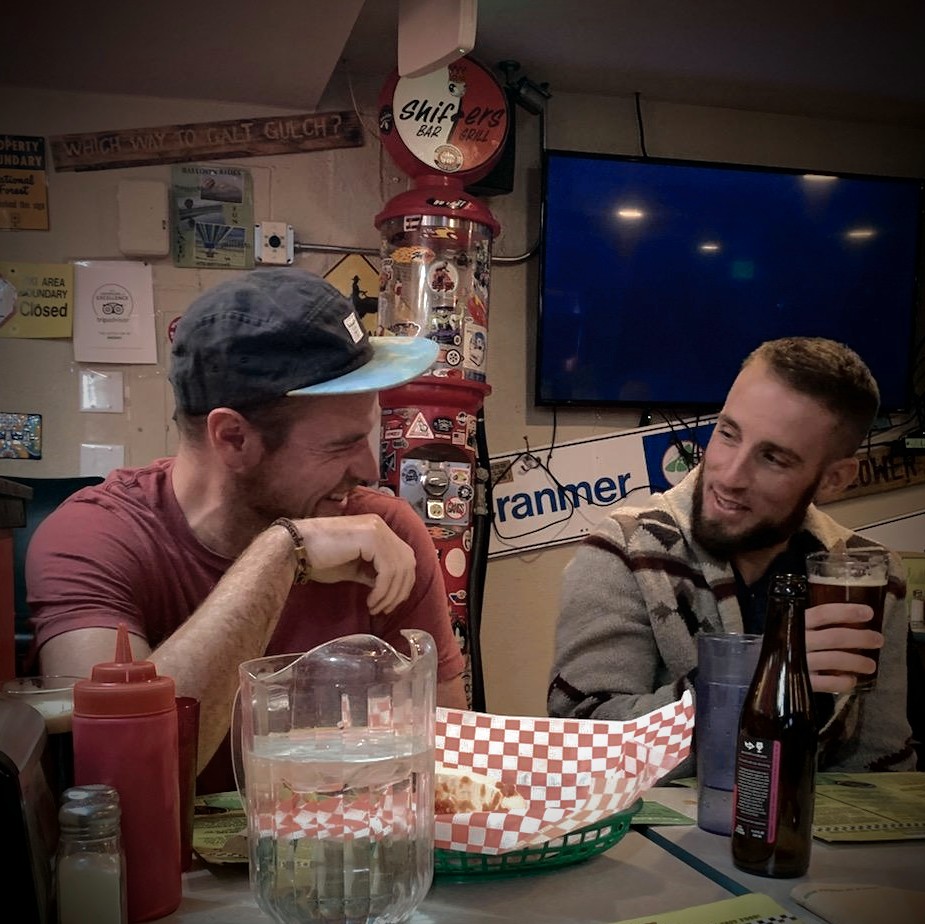“I believe when we love someone, we respect them, and we listen to them; we feel that their voice matters. And we let them dictate the terms of who they are and what their story is.”
-Laverne Cox
I spent the majority of my flight back from New York last month watching TED talks on my Kindle. The topics varied from politics, to the equation for intelligence, to why people cheat in relationships. However, the one that really hit home was given by Dave Isay titled “Everyone around you has a story the world needs to hear.” I couldn’t agree more, The basic premise of the talk is that Dave started a company called StoryCorps and it got me thinking what is StoryCorps?
.The entire goal of StoryCorps is to create a quiet place where a person could honor someone who mattered to them by listening to their story. The concept is pretty simple, you and someone important to you would go into a booth with a moderator and have a conversation about anything you wanted. The moderator would record the conversation and then give you one copy to keep forever and send a duplicate copy of the conversation to the American Folklife Center at the Library of Congress to ensure that the conversation would be able to be shared with future generations.
Related: This Must be the Place
The more I listened to his talk the more I realized what StoryCorps is and how fucking cool StoryCorps it is. How often do we look back and wish we’d done more to document the past?. Regardless of it’s things we’ve done or moments with people we love, humanity seems to do a terrible job of recording the ones that actually matter; and no, Instagramming what you had for dinner last night doesn’t count.
Sadly, we don’t seem to realize how important recording the important stuff is until it’s too late.
Once you lose someone, it hits you. You can’t go back and recreate those memories. Even in my limited life experience, there are lingering questions that I have for people who I will never be able to get an answer from. From an “interviewer” standpoint, StoryCorps gives us all a reason to have real, deep, and meaningful conversations with people we care about. The ones we hope are never forgotten.
Related: On Free Spirits
What’s even cooler (and less selfish) is the side of the interviewee. I’m a firm believer that everyone has a story to tell. Hell, that’s one of the biggest reasons I write – to share my story. It’s why I’ve kept this blog going even after I stopped traveling. What’s rare is for people to actually get to share their story. So what is StoryCorps? It’s a place for people to get to share their story.
“My story is important not because it is mine, God knows, but if I tell it anything like right, the chances are you will recognize that it many ways it is also yours.” -Fredrick Beuchne
That realization is what allows people to feel connected. In order to feel that, people have to be willing to share.
I get it. Not everyone is a writer. Not everyone thinks they have a way with words. Not everyone is comfortable openly declaring their past mistakes, hopes, and dreams for all to read. Some people need that push. They need to know that someone is there and truly listening to them.
The beauty of StoryCorps is that it helps to give people a reason to share their story; not only with their loved ones, but with the world. There has never, in the history of human existence, been anyone like you.
Let that sink in.
Everything you’ve gone through is special and unique. If you don’t find a way to share your story, then it will be lost forever when you’re gone. One of the biggest things we can do is to accept our own mortality, learn to embrace it, and do our best to leave a legacy.
“Everyone has a story to tell, but don’t think that by listening to someone else’s that they’re telling yours. Everyone has a different, unique story, and it’s not better if it’s not your version. Tell it and the world will listen. And maybe someone will be inspired to share a story of their own.” – Brendon Patrick Cooney
The concept for StoryCorps isn’t just about documenting your story for strangers. It’s mainly about giving your friends and family something to hold onto once you’re gone. For anyone who’s ever lost someone close to them, think how great it would be to have one deep conversation recorded that you could listen to so you never forget them. To help you show others who may not have known them exactly who that person was and why they were so important to you.
Related: On Letting Go
While I was listening to Isay speak, my first thought was how I needed to locate the nearest StoryCorp location, drag my friends and family there with me, and record a conversation. After all, who knows if your last conversation with someone is truly the last one you two will ever have?. I felt such an incredible pull to hurry and get as much on record as I could.

How does one go about finding a StoryCorps location?
I had no idea. But the good news is I don’t have to know. Since the folks over at StoryCorps are brilliant, of course they’ve created a StoryCorp app to help as many people record conversations as they can. Instead of having to find a StoryCorps location, travel there, and record your conversation with a moderator, all you need now is two people and a cell phone. (I did some more research and you can make a reservation at a StoryCorps near you. You can also go on the StoryCorps website and listen to other people’s conversations. If you choose to do so, you’ll quickly realize just how compelling of a story everyone has.
For those who aren’t sure what to ask, don’t worry,, the StoryCorps app is there to help. There’s a legitimate “Prepare an Interview” section that give you a list of questions such as: tell me your favorite memory of me, what are you most grateful for, how do you want to be remembered, what are your thoughts on God, etc. As I looked at those and other questions my mind started racing. Who do I want to interview? What do I want to ask them? How soon can I get started?
Some of you may say those things don’t matter. You can care for someone and not know those answers. That those questions are personal and none of my business. Well I couldn’t disagree more. When you truly care about someone, and they’ve had a positive impact on you, the least you can do is find out who they are and what their life has really been about. Give them the gift of sharing their story with someone who really cares.
The more questions I read the more I realized how little I knew the most important people in my life. I couldn’t tell you how my parents met, how my dad proposed, what my sister’s happiest memory is, what my best friend is most grateful for, or the passion that has defined my grandpa’s entire life.
Related: The most important question or you life
To be fully honest, I was wracked with guilt. I, who pride myself on “deep meaningful conversations” had no real answers about the people closest to me. Why had I never taken the time to hear their stories? Have I been so self-obsessed that I didn’t see the importance of the people around me? That just like me, they all had hopes, fears, dreams, desires, and goals. That each of them has experienced anger, embarrassment, joy, pain, and regret. Yet I knew so few of the details.
As I thought more about it, the definition of Sonder popped into my head.
Sonder is the realization that each random passerby is living a life as vivid and complex as your own- populated with their own ambitions, friends, routines, worries, and inherited craziness- an epic story that continues invisibly around you like an anthill sprawling deep underground, with elaborate passageways to thousands of other lives that you’ll never know existed, in which you might appear only once, as an extra sipping coffee in the background, as a blur of traffic passing on the highway, as a lighted window at dusk.
It’s such a simple concept, but one with a profound reach. When you think about it, clearly you’re aware that everyone around you is living a life as full and vivid as your own (from their perspective), however rarely do we dive in and question them about it. Understanding what sonder means a necessary requirement to practice empathy.
If watching the StoryCorps TED talk did anything, it’s made me realize how vital hearing and exploring other people’s stories are. By actually taking the time to listen to someone else’s journey we can learn more about our own. By taking a single hour out of our day we can create a memory not just for ourselves, but for all future generations. By choosing to answer difficult questions we can truly gain a deeper understanding of those we love.

Going forward, I’m determined to help people share their stories. That’s one of the main reasons I’ve been encouraging people to send me their ideas to publish on Of Whiskey and Words. I want to help people understand the power of their story. To understand its importance and value.
The best place to start is with those closest to me. Below (in no order) is a short, non all- encompassing list of people I’d love to sit down with for a StoryCorps conversation:
-Sandi & Lonnie Smidt -Jordan Richards
-Amanda Donahue -Cameron Day
-Sue & Dirk Racine -Brett Nelson
-Tom Haley -Lapthan Ngo
-Jordan France -Nicole Ostertag
-Zoran Pavlovic -Mac Sakchutchawan
-Nick Elsberry -Emma Levine
-Jim Batt -Shaina Lay
-Adam Fichman -Seif Aref
If any of you are interested please let me know. If anyone reading this would like to have a StoryCorps session with me, don’t hesitate to reach out.
Even if you’re not interested in recording the conversations with the people closest to you these are conversations that you should still be having. Even if you don’t believe you need a tangible recording to listen to later on it’s still vital that you take the time to truly get to know the people around you. After all, they won’t be around forever and the greatest thing you can do for them is to let them share their story.
So what is StoryCorp? It’s your opportunity to be heard.
Stay Gold.


